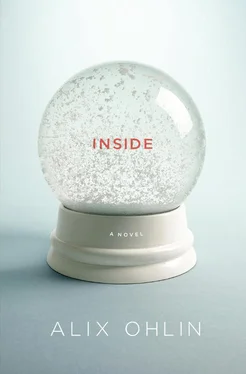The next day he went over. He found her on the couch wearing a gray sweater, the bottom half of her body swaddled in a thick wool blanket, her cast a raised lump beneath it. She looked better than she had in the hospital, but not by much. A small end table was set up with essentials: a glass of water, a box of tissues, a cluster of yellow pill vials.
“Thanks again for doing this,” she said.
“Stop thanking me,” Mitch said. “Please.”
She grimaced a little, as if her pride hurt as much as her injuries. Looking at the place more closely than he had the first time, he noticed that the furniture was slipcovered in her favorite colors, blues and pale greens, and he recognized several of the watercolors hanging on the walls. At a cruel moment late in their marriage, he had told her that her taste was bland; now it struck him as soothing, and he felt peculiarly at home. It was a quiet place, still as a pond.
“Sarah’s over at a friend’s,” Grace said. “Here, I have a list.”
On a yellow legal pad — and Mitch remembered now that she had always used one as a student — she had written down a succession of chores. Laundry. Groceries, with each item detailed down to the brand. Sarah’s schedule, when to drop her off and when to bring her back. The things Sarah liked for lunch. A manual of parenting, with everything explained, in Grace’s round, neat handwriting.
Her voice was all business. “I’ll tell you where the laundry baskets and the machines are,” she said. “Are you sure you don’t mind doing this?”
“Please,” he said. “I’m glad to have something to do.”
It sounded more pathetic than he intended, as if he didn’t have anything else to do, which wasn’t exactly true. Or possibly it was a little bit true. But he busied himself around the place for an hour or so, then went out to Loblaws and came back to unload the groceries into the fridge and cupboards. All the while Grace lay on the couch, drifting in and out of consciousness. At first she seemed to make an effort to raise her head when he came into the living room, but when he told her to rest she closed her eyes gratefully.
He did laundry in the basement, nodding at a neighbor who glanced at him curiously, and ran a few errands off Grace’s list during the washing and drying cycles. When the clothes were dry, he brought them back up to the apartment and put her things away in her dresser, trying not to look too closely at the underwear. Sarah’s impossibly small clothes went into the white dresser in her room. When he came back into the living room, Grace’s eyes were open, but her expression was even more strained.
“Are you okay?” he blurted. “Is the pain worse?”
“I have to ask you to do something,” she said. “I am so, so sorry about this.”
Right away he knew what it was, and oddly enough felt no hesitation. It was a relief to have another specific, physical task that needed to be accomplished. “It’s all right. Remember when you got food poisoning in India? I’ve already been through the worst.”
“Thanks for bringing that up,” she said, but then she smiled.
He crouched near her. She smelled both gamy and chemical, like a specimen left unattended too long in some dusty lab. An unwashed scent mixed with the must of bandages and ointment. She pointed at the bedpan under the end table, and when he arranged it beneath her, tears glistened in her eyes from the pain of the jostling. “I’m sorry,” he whispered.
“It’s not your fault.”
He left her alone for a few minutes, then collected and emptied the bedpan. When he came back again, Grace had cleaned herself and he disposed of the trash she’d left in a container by the couch. Her eyes had a burning, febrile expression, part humiliation, part pain.
“Worse than India?” he said.
“Much worse,” she said.
He squeezed her hand and put his arm around her as gently as he could, and her head collapsed against his chest, her body buckling with a sob. For a few minutes they sat like that, then she shook her head and wiped her eyes. The most awful moment, he understood, had passed.
At five o’clock Sarah’s friend’s mother brought her home, and Sarah approached the couch with the same fearful care that Mitch had noted in the hospital. He microwaved some pizza, poured juice, and set up a video for her to watch on the TV. She was very quiet and sat beside her mother on the couch with her knees curled up to her chin, leaning timidly into the corner cushions.
An hour later, when a friend of Grace’s stopped by to help them get ready for bed, Mitch said it was time he left.
“Thank you,” Grace said, her eyes again filling with tears.
“Please,” he said. “It’s all right.”
So he slipped into her life through the side door. He didn’t think that much about it, or wonder if it was right or wrong. What he’d told her was the truth: he was grateful to have something to do.
Over the next two weeks, he stopped by Grace’s every few days. He stocked the apartment with food. He drove Sarah to school and back home. He did laundry.
When he mentioned to his brother on the phone what was happening, Malcolm laughed. “I never pictured you as Mr. Mom,” he said.
Mitch was annoyed. “That’s not it,” he said, and explained that other friends of Grace’s were also taking turns in the rotation. But it was true that he never much bothered with these domestic tasks in his own life, where he had only himself to look after.
“Okay,” Malcolm said good-naturedly. “Isn’t it weird, though, hanging out with Grace and her kid?”
“No,” Mitch said. “Not after such a long time, anyway.”
But parts of it were, in fact, a little weird. Sarah, for example, was totally different from Mathieu. If he lived in a universe boundaried by his own mind, a planet of dinosaur facts and physics equations, she craved constant interaction with other people. She always ran to the door to let Mitch in, less out of any particular affection for him than a burning desire to talk to someone. She told him stories, put on costumes and danced for him, held his hand and asked him to play. Her need for attention was infinite. He wondered if she had been like this with Grace before the accident or if her clinginess came from knowing that her only parent was fragile and could disappear. He often came home exhausted, not from doing chores but from playing with Sarah.
As for Grace, she sometimes had bad days when her pelvis was hurting — she was trying hard to cut down on her pain medication — and would snap at him or barely register his presence. Other days, desperate for company after lying alone by herself in the apartment all day, she wanted to talk almost as much as her daughter.
One night the three of them played Sorry! a game Mitch hadn’t seen since he was a child and was amazed still existed. Sarah clasped her hands together in feverish concentration as she bent her head over the pieces. She knew all the rules, about bumping and sliding and the safety zone, and explained them to him carefully, condescendingly, as if he were the nine-year-old. But he kept messing up — doing things with his pawn that he wasn’t supposed to — at first because he didn’t remember how to play and later just to get a rise out of Sarah, who rolled her eyes, stuck out her palms with exaggerated irritation, and exclaimed, “Mitch! How many times do I have to tell you about this!”
“Sorry, Sarah. I’m old and slow.”
She nodded. “I know that. You can’t help it.”
Across the table, Grace’s eyes met his, sparkling with suppressed laughter, and he smiled. He was having a good time. And it was peculiar to find himself once again in the company of a single woman and her child. Not that they were replacements for Martine and Mathieu. The time he spent with them was at once less stressful, with no element of romance, and more uncomfortable, because his role was less defined. Sarah was less extreme in her behavior than Mathieu, and Grace was far less tempestuous than Martine. It felt not like a repetition of the previous triangle but a new version of it, from another angle. A pattern stretching across the recent years of his life.
Читать дальше












